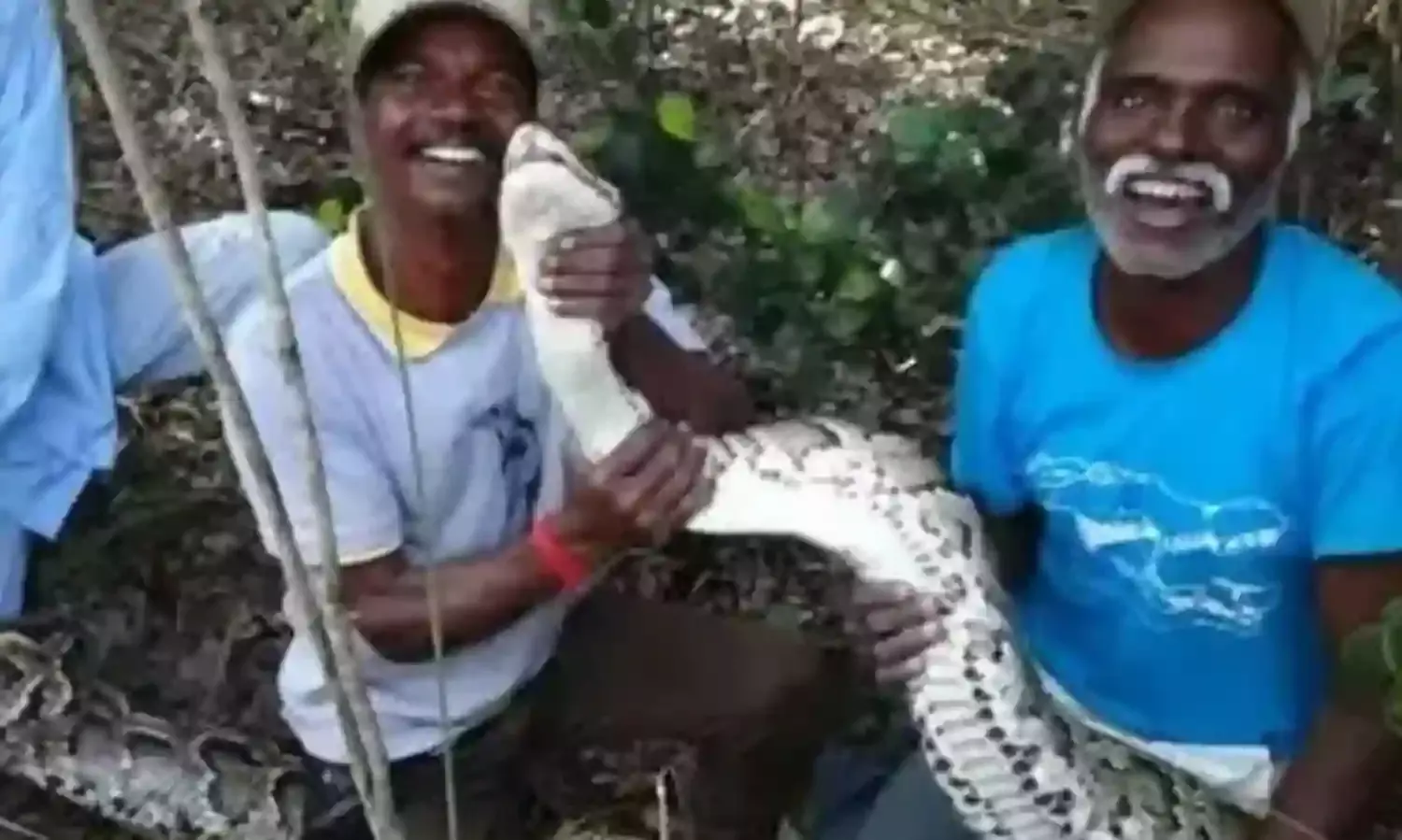Snake Catchers Get Padma Shri, Hope For Better Future
Vadivelu Gopal, Masi Sadaiyan of the Irular Snake Catcher's Cooperative Society get India’s fourth highest civilian award

When Vadivelu Gopal (58) and Masi Sadaiyan (54) received news that they were awarded the Padma Shri on Republic Day, they were elated. Masi and Vadivelu are both members of the Irula Snake Catchers Cooperative Society and were recognised for their extraordinary contribution to social work.
"We were catching snakes in Karur when we heard the news. It was unbelievable," says Vadivelu, who has been catching snakes since he was around 11 years old. Vadivelu and Masi belong to the Irular tribe and learnt the art of snake catching from their fathers. It has been a generational skill that is passed on mostly to men, but also to some women in the family.
Masi and Vadivelu have been catching snakes for more than 30 years and are proud of their work. Masi said, “Snake catching is an honour for me. I was born into the Irular community for a purpose, and that is to protect my fellow beings. In our villages in Kanchipuram, there would be snakes around all the time. Anytime anyone needed my help to catch snakes, I was ready. I never said no."
Till the 70s, the Irulars used to catch snakes and sell the skin for money. But after wildlife conservationist Rom Whittaker took steps to stop the trade, hundreds lost their livelihood. In 1978, Whittaker helped set up the Irula Snake Catchers Cooperative Society instead. Today, there are about 300 licensed snake catchers belonging to the cooperative.
These licensed workers are authorised to catch the 'Big Four' snakes, which are the Common Krait, Indian Cobra, Russell's Viper and Saw-scaled Viper. About 90 per cent of the snake bites in India happen because of these snakes. Once the snake catchers catch them, the venom is extracted and antivenom is prepared. It is from here that anti-venom is sent to the rest of the country.
Masi and Vadivelu were in their early teens when the cooperative was first set up. Their extraordinary skill was noticed by Whittaker, who hoped to give them better opportunities. In 2016, he decided to take them to Florida to help the authorities there catch Burmese pythons, whose population in the area had increased significantly.
The Florida Wildlife Commission approved the project and Masi and Vadivelu were taken there in January 2017 to catch Pythons. For two months, they scoured the Wetlands and caught more than 25 Pythons in the first month itself.
Masi recalls the experience. "They took care of us well, and made sure we had everything we needed. They even ensured we had food that we were used to. Every morning, we would step out and go with a group of locals. We used our traditional methods to catch the Burmese Pythons. But we also learnt new techniques. It was a great experience. Even after we got back, we were told that everyone was talking about us. It felt nice to be recognised and appreciated."
But not much has changed for them back home. Masi says that the snake catchers in the society get about one hunting trip a month. They earn just about Rs 5,000 a month, despite the huge risk they put their lives at, catching some of the most poisonous snakes in the world.
John, a social worker who has been closely working with the Irulars, said that many members of the society are considering giving up their licences, as they don't feel they are compensated enough for their effort and for the risks they undertake. They feel that they would be paid far more if they take up daily wage jobs. "The government is earning so much because of the snakes they catch, but the people who do the actual work are not paid adequately," he said.
Masi recalls how he has been bitten by Cobras a couple of times. "But we are used to the risks, we know what to do. We stay calm, use traditional medicine for first aid and then go to the hospital," he said. Despite these risks he puts himself at, he has not been able to earn enough to even provide proper education to his three children.
The Irulars also continue to face discrimination because of their identity, especially at the hands of government officials. The Irulars have always been criminalised and have often been faced with police brutality just because of their identity. Members of the community have often been slapped with fake charges against them.
They are not respected when they go to government offices or when they seek jobs elsewhere, causing huge obstacles in their progress. For Vadivelu and his family, the award means more than just a recognition of his hard work. He hopes that it will wipe away the years of discrimination their community has endured.
There are a lot of people struggling without proper housing and basic facilities. Vadivelu hopes that members of his community are able to get good jobs and this starts with being accepted first.



